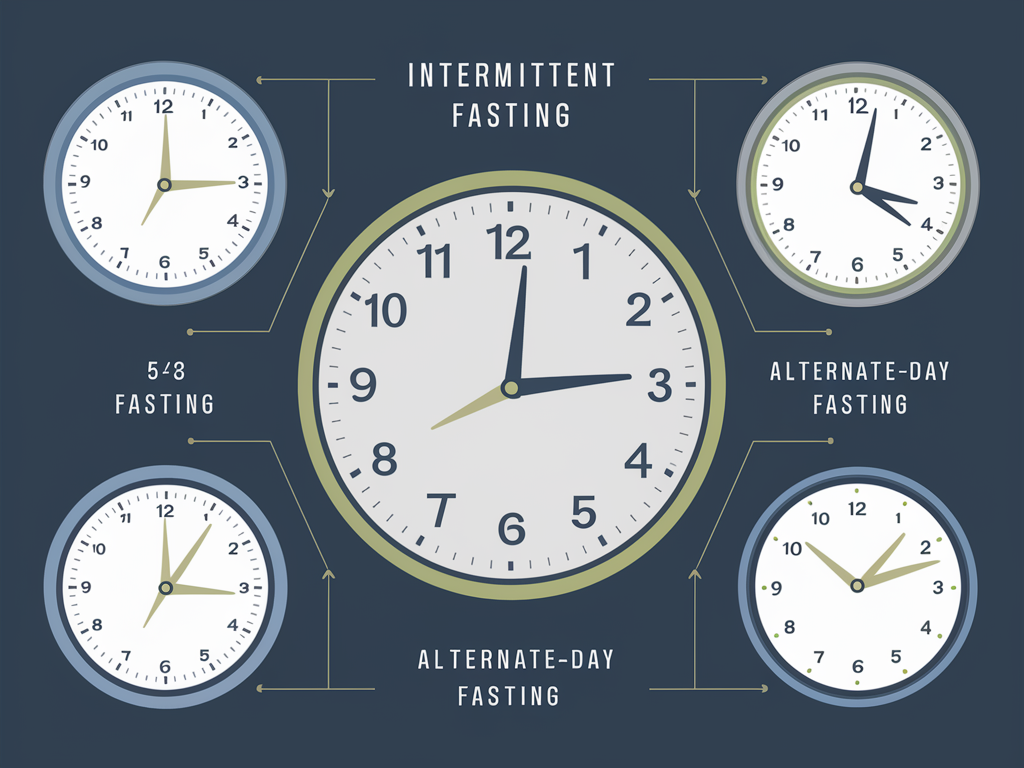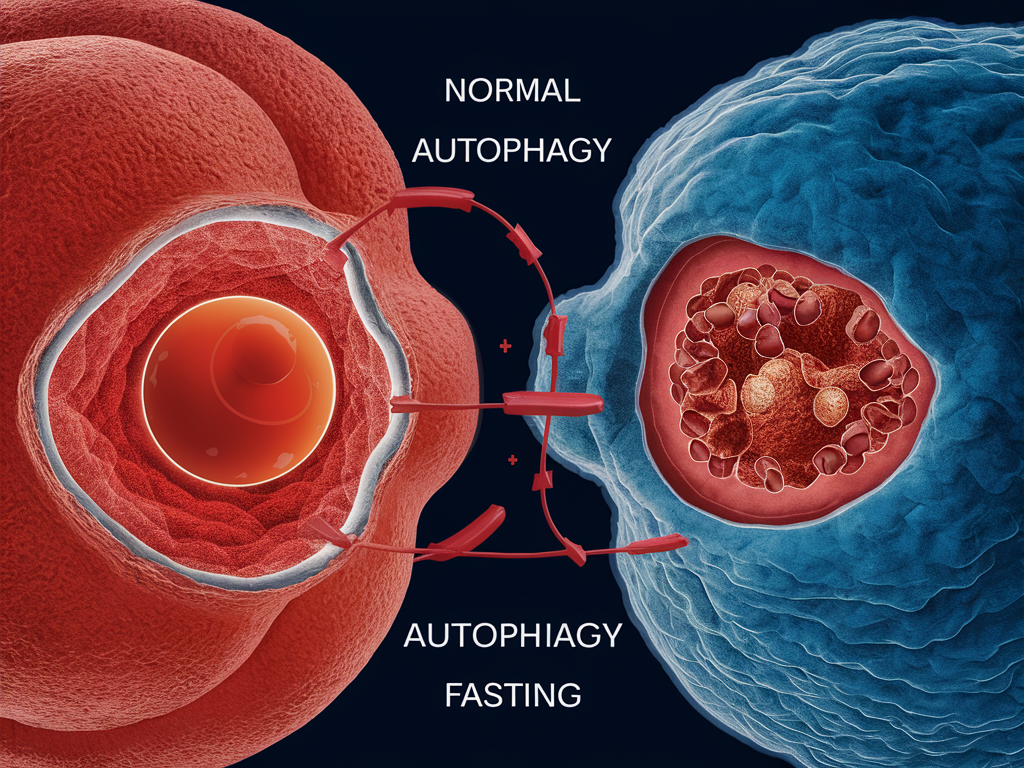Intermittent fasting has emerged as one of the most popular health trends in recent years, transforming from an ancient practice into a scientifically studied dietary approach. Unlike traditional diets that focus on what to eat, intermittent fasting centers around when to eat, creating designated periods of eating and fasting. This time-restricted eating pattern has garnered substantial attention from researchers and health enthusiasts alike for its numerous potential health advantages.
Several intermittent fasting methods have gained popularity, including:
- The 16/8 Method: Restricting eating to an 8-hour window daily (e.g., 12pm-8pm) and fasting for 16 hours
- The 5:2 Diet: Eating normally five days per week and reducing calorie intake to 500-600 calories on two non-consecutive days
- Eat-Stop-Eat: Incorporating one or two 24-hour fasts weekly
- Alternate-Day Fasting: Alternating between fasting days and regular eating days
- The Warrior Diet: Eating small amounts of raw fruits and vegetables during the day and one large meal at night
While the concept of fasting isn’t new, scientific interest has surged as researchers discover its profound physiological effects beyond simple calorie restriction. Let’s explore 15 evidence-based benefits that might make intermittent fasting worth considering for your health regimen.

1. Weight Loss and Fat Reduction
Intermittent fasting facilitates weight management through several mechanisms. By limiting eating windows, most people naturally consume fewer calories, creating a caloric deficit without strict counting. Research published in the International Journal of Obesity shows that intermittent fasting can lead to 3-8% weight loss over 3-24 weeks, with participants losing significant belly fat.
Unlike conventional diets, studies suggest intermittent fasting may help preserve muscle mass during weight loss. A review in Obesity Reviews found that intermittent fasting resulted in comparable fat loss to continuous calorie restriction but with better muscle retention. This has particularly significant implications for long-term metabolic health and functional ability.
2. Improved Insulin Sensitivity
During fasting periods, insulin levels naturally decline, allowing fat cells to release stored sugar for energy. This cyclical pattern improves insulin sensitivity, enabling the body to regulate blood glucose more effectively. A study in Cell Metabolism demonstrated that intermittent fasting improved insulin resistance by 3-6% in prediabetic individuals over a 5-week period, with some participants returning to normal blood sugar levels.
This improved glucose metabolism makes intermittent fasting a promising preventive approach for type 2 diabetes. Research in the Journal of Translational Medicine showed that participants following time-restricted eating had significantly better glucose control even when consuming identical calories to control groups, highlighting benefits beyond simple calorie reduction.
3. Reduced Inflammation
Chronic inflammation underlies many modern diseases, from arthritis to heart disease. Intermittent fasting has demonstrated anti-inflammatory effects in multiple studies. Research in Nutrition Research observed significant decreases in inflammatory markers like IL-6, TNF-?, and CRP in subjects practicing various intermittent fasting protocols.
The mechanisms behind these anti-inflammatory benefits appear multifaceted. Fasting triggers cellular stress resistance pathways, reduces oxidative damage, and optimizes energy metabolism—all contributing to lowered inflammation. A 2019 review in Ageing Research Reviews concluded that intermittent fasting’s anti-inflammatory effects might be one of its primary pathways for preventing chronic diseases.
4. Enhanced Heart Health
Cardiovascular disease remains the leading cause of death globally, making heart-protective strategies crucial. Intermittent fasting improves several key risk factors for heart disease. Clinical trials have documented reductions in:
- LDL cholesterol (the “bad” cholesterol) by 10-20%
- Blood triglycerides by 20-30%
- Inflammatory markers associated with heart disease
- Blood pressure in hypertensive individuals
- Blood sugar levels and insulin resistance
A landmark study in Cell Metabolism found that intermittent fasting improved blood pressure, resting heart rates, and heart rate variability—a key marker of cardiac health. These benefits appeared partly independent of weight loss, suggesting unique cardiovascular advantages to the fasting process itself.
5. Cellular Repair and Autophagy
Perhaps one of the most fascinating benefits of intermittent fasting is enhanced autophagy—a cellular “housekeeping” process where cells digest damaged components, proteins, and even harmful pathogens. During fasting periods, autophagic activity increases significantly as cells recycle unnecessary or dysfunctional components.
This cellular cleaning process may help prevent cancer, neurodegenerative disorders, and infections while slowing overall cellular aging. Research in Nature journal demonstrated that fasting periods of 24+ hours can increase autophagy markers by up to 300%, potentially explaining many of fasting’s long-term health benefits.

6. Brain Health and Cognitive Function
Intermittent fasting appears to benefit our most complex organ—the brain. During fasting, the body increases production of brain-derived neurotrophic factor (BDNF), a protein that promotes neural health and neuroplasticity. Higher BDNF levels are associated with improved learning, memory, and cognitive function.
Animal studies published in The Journal of Neuroscience indicate that intermittent fasting may protect against neurodegenerative conditions like Alzheimer’s and Parkinson’s diseases. Human research remains preliminary but promising, with multiple studies noting improved reaction time, working memory, and verbal memory in adults practicing intermittent fasting protocols. Many practitioners also report subjective experiences of enhanced mental clarity and focus during fasting periods.
7. Extended Lifespan Potential
While definitive human longevity studies would take decades to complete, preliminary evidence suggests intermittent fasting may promote longer life. Animal research consistently shows impressive lifespan extensions in various species practiced with fasting protocols. For instance, studies on mice have demonstrated lifespan increases of 30-40% with various intermittent fasting approaches.
In humans, researchers focus on “longevity markers”—biological indicators associated with longer lifespans. Intermittent fasting favorably influences many such markers, including:
- Reduced oxidative stress
- Lower inflammation levels
- Improved insulin sensitivity
- Enhanced autophagy
- Reduced risk factors for age-related diseases
A comprehensive review in The New England Journal of Medicine concluded that intermittent fasting’s cellular and metabolic adaptations are remarkably similar to those seen with regular exercise—a well-established longevity promoter.
8. Improved Metabolic Rate
Contrary to the “starvation mode” myth, short-term fasting may actually boost metabolic rate. Research in the American Journal of Clinical Nutrition found that fasting for 48 hours increased metabolism by up to 14% through elevated norepinephrine levels—a hormone that instructs fat cells to release fatty acids for energy.
Additionally, intermittent fasting appears to improve metabolic flexibility—the body’s ability to switch between burning carbohydrates and fats for fuel. This enhanced adaptability may explain why many long-term intermittent fasting practitioners report stable energy levels despite periods without food. Over time, these metabolic adaptations may help prevent the metabolic slowdown typically associated with dieting.
9. Better Blood Sugar Control
Beyond improving insulin sensitivity, intermittent fasting offers additional benefits for blood sugar regulation. Studies in the Journal of Applied Physiology show that even short-term fasting can significantly reduce blood glucose levels independent of weight loss, potentially by giving pancreatic cells a rest from constant insulin production.
For those with prediabetes, intermittent fasting may be particularly beneficial. A study in Cell Metabolism involving prediabetic men found that even restricting eating to a 6-hour window (with the same caloric intake) improved insulin sensitivity, blood pressure, and oxidative stress markers before any significant weight change occurred. Some participants normalized their blood glucose levels entirely, highlighting fasting’s potential as a prediabetes intervention.
10. Hormone Optimization
Intermittent fasting creates favorable changes in several hormone levels. Human growth hormone (HGH), which promotes fat metabolism and muscle growth, can increase dramatically during fasting periods—with some studies noting five-fold increases after just 2 days of fasting.
Additional hormonal benefits include:
- Improved insulin sensitivity and lowered insulin levels
- Increased noradrenaline for fat breakdown
- Optimization of leptin and ghrelin (hunger hormones)
- Enhanced testosterone levels in some studies (particularly in combination with exercise)
- Better adiponectin levels for fat metabolism
These hormonal changes collectively create a biochemical environment conducive to fat loss, muscle preservation, and cellular repair that’s difficult to achieve through other dietary interventions alone.
11. Gut Health Improvement
Digestive organs benefit from periodic rest, and research increasingly shows intermittent fasting supports gut health. A study in Cell Reports found that fasting periods promote intestinal stem cell function and regeneration of the intestinal lining, potentially reducing gut permeability (“leaky gut”) associated with various health issues.
Fasting also appears to beneficially modify the gut microbiome composition. Research in the American Journal of Physiology demonstrated shifts toward bacterial species associated with reduced inflammation and improved metabolic health. Many individuals with irritable bowel syndrome, GERD, and other digestive complaints report symptom improvement when adopting intermittent fasting, likely due to reduced digestive workload and inflammation.
12. Enhanced Exercise Performance
Athletes increasingly utilize intermittent fasting for performance benefits. Research in the Journal of the International Society of Sports Nutrition shows that training in a fasted state increases fat-burning capacity and mitochondrial development—improvements particularly valuable for endurance athletes.
The hormonal environment during fasting (elevated growth hormone and norepinephrine) may also enhance recovery between workout sessions. Additionally, contrary to conventional bodybuilding wisdom, studies indicate that training while fasted doesn’t necessarily compromise muscle maintenance or growth when protein intake remains adequate during feeding windows. The metabolic flexibility developed through intermittent fasting can prove advantageous for performance across various exercise disciplines.

13. Simplified Lifestyle and Food Relationship
Beyond physiological benefits, intermittent fasting offers practical lifestyle advantages. Many practitioners report freedom from constant meal planning, preparation, and cleanup, saving significant time and mental energy. Research in the Journal of Nutrition Education and Behavior found that time-restricted eating helped participants develop healthier relationships with food and greater awareness of hunger and satiety cues.
For those battling emotional eating or food addiction, intermittent fasting can help break unhealthy psychological patterns by creating clear boundaries around eating times. A study in Frontiers in Psychology noted that intermittent fasting practitioners experienced reduced food preoccupation and improved body image after adapting to consistent fasting schedules.
14. Reduced Oxidative Stress
Oxidative stress occurs when unstable molecules called free radicals damage cells, proteins, and DNA—a process implicated in aging and disease development. Multiple studies confirm that intermittent fasting reduces oxidative damage. Research in Redox Biology demonstrated that alternate-day fasting increased antioxidant enzyme production while decreasing markers of oxidative stress by up to 30%.
This protection appears partly due to hormesis—the biological principle where exposure to mild stressors (like food deprivation) triggers protective cellular responses. These adaptations strengthen cells against future stress, similar to how exercise temporarily stresses muscles to make them stronger. By periodically activating these protective pathways, intermittent fasting may help prevent diseases ranging from diabetes to cancer.
15. Potential Cancer Prevention Benefits
Cancer research on intermittent fasting shows promising results, though human studies remain in early stages. Laboratory and animal studies indicate several anti-cancer mechanisms:
- Reduced IGF-1 (insulin-like growth factor) levels, which may slow tumor growth
- Enhanced autophagy, helping clear precancerous cells
- Lowered inflammation and oxidative stress
- Metabolic improvements that create less favorable conditions for cancer development
- Potential enhancement of cancer treatment effectiveness
A review in Nature Reviews Cancer concluded that various fasting protocols might complement traditional cancer treatments by protecting normal cells while sensitizing cancer cells to therapy. Some oncologists now incorporate modified fasting protocols alongside conventional treatments, though anyone with cancer should consult their healthcare team before attempting any fasting regimen.
Practical Considerations for Starting Intermittent Fasting
While the benefits of intermittent fasting are substantial, implementation considerations include:
- Start gradually: Begin with shorter fasting periods (12-14 hours) before attempting longer durations
- Stay hydrated: Drink plenty of water, black coffee, or unsweetened tea during fasting periods
- Focus on nutrition: During eating windows, prioritize nutrient-dense whole foods rather than processed options
- Listen to your body: Modify your approach based on energy levels, mood, and overall wellbeing
- Be patient: Many benefits develop over weeks or months, not days
Importantly, intermittent fasting isn’t appropriate for everyone. Those who should consult healthcare providers before attempting fasting include:
- Pregnant or breastfeeding women
- People with diabetes (especially those on medication)
- Those with a history of eating disorders
- Individuals with low body weight
- People with serious medical conditions
- Children and adolescents
Intermittent fasting represents a flexible eating pattern that aligns with human evolutionary biology while offering numerous evidence-based health benefits. From weight management to cellular repair and disease prevention, the scientific support continues growing. By focusing on when rather than what to eat, intermittent fasting offers a refreshingly simple approach to health improvement that may complement other positive lifestyle behaviors.
As with any health intervention, individual responses vary. The ideal approach incorporates personalized adjustments based on your unique health status, goals, and lifestyle preferences. When implemented thoughtfully, intermittent fasting may provide a sustainable pathway to improved health and wellbeing without the complexity of conventional dieting approaches.

